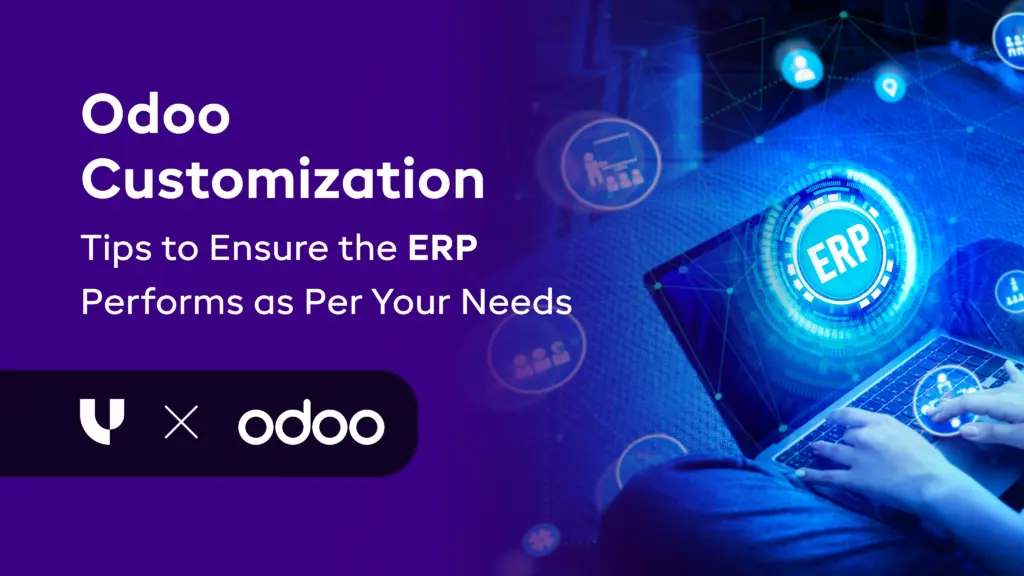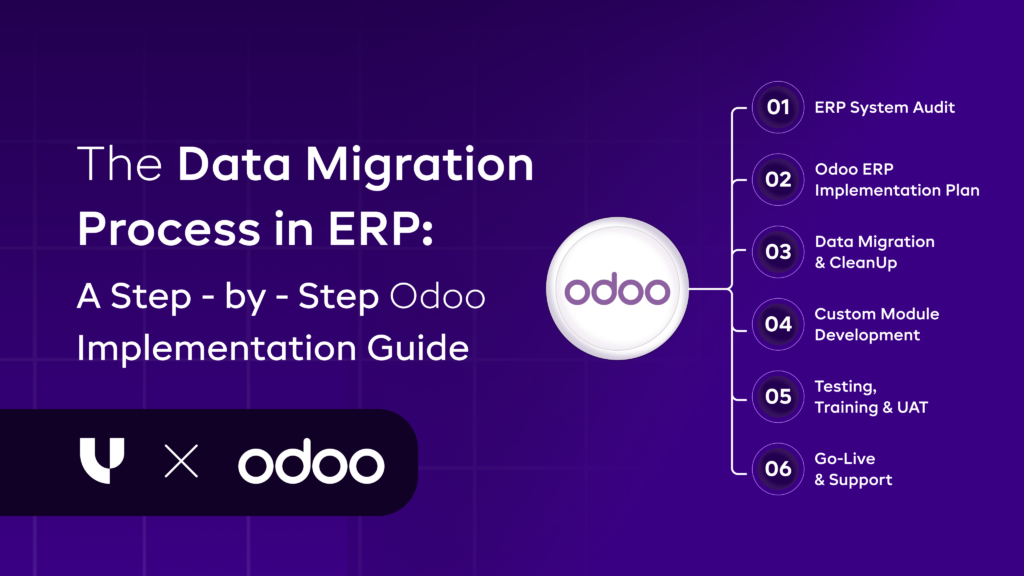Odoo Customization – Tips to Ensure the ERP Performs as Per Your Needs
Published on October 24th 2025

Introduction
Odoo is one of the most popular and widely used business software suites today, with over 15 million active users worldwide by 2025 (including both community and enterprise editions).
Businesses from diverse backgrounds are customizing Odoo to meet their specific business needs and operations, spanning from healthcare to eCommerce, entertainment to education.
But why is Odoo becoming the preferred choice for organizations seeking a scalable CRP and CRM solution?
The answer is customization.
Thanks to Odoo’s custom nature, you can easily optimize your operations in no time.
In this blog, we take a closer look at some tips to ensure ERP performs as per your needs. Let’s get started.
Setting Up the Development Environment
Setting up your development system is one of the most effective steps you can take for your Odoo ERP customization. To support Odoo's complex structure, it is crucial to have a stable environment for your system.
This approach involves setting up the necessary tools to execute and test your code without any issues.
Steps to Set Up Your Development Environment
Step 1: Get a Python interpreter
Python is the base language used in developing Odoo's framework. You can choose between Python 2.x and Python 3.x based on your requirements or the nature of your project.
Step 2: Set up the Odoo framework
This process is quick and straightforward with Odoo's installer script. Once you’ve installed the program, run the installer and give it a dedicated space within your system.
Step 3: Get a coding editor or IDE
Begin by using an Integrated Development Environment (IDE) to write and organize your code. Two of the most common alternatives are Visual Studio Code and PyCharm.
Step 4: Use Git or another version control system
It may help you keep track of the modifications being made to your code. It also allows you to work with multiple developers, change and revert to older code versions, and manage testing and deployment.
Step 5: Test locally first
Set up a local development server to execute and test Odoo apps. You can utilize something like Docker. A local server can help you test your environment and identify what works and what needs improvement or removal.
How to Assess Your Business’ Needs Before Implementing Odoo Module Customization?
Evaluate Based on Your Unique Requirements
Each firm has its own workflows, processes, and goals. To ensure that Odoo customisation is a good fit, it is essential to consider these needs. Begin by carefully reviewing how your current operations work. Then you can figure out what hurts and what needs to be fixed.
You may also consider all of these issues within your firm and the industry as a whole. This will help you find Odoo's customization options that can address these problems. Also, ensure there is room for development and expansion. Your strategy needs to be flexible enough to be changed in the future. It has to be able to adapt to the changing dynamics of your business.
Get Your Key Stakeholders Involved in the Process
Everyone in your firm should be able to see how Odoo module customisation is done, at least for those who matter. Department leaders, IT or development teams, end-users, and the marketing team must all be aware of your Odoo modification strategy.
These individuals are crucial to the day-to-day operation of your business. You may utilize these ideas to make a foolproof plan for customizing an Odoo module. Get ideas from your team, review them, and then develop a strategy based on what everyone has shared. It ensures that your personalization meets the demands of your business now and in the future.
Plan Customization Layout
After getting your team's ideas, you need to make a precise strategy based on all the information you've acquired. Your customization plan will help you keep track of your progress as you make these adjustments.
You should focus on activities that will have a significant impact on your business and make your everyday duties more efficient if you want your Odoo module customization to function effectively. Some things to think about include ROI, short- and long-term company demands, and long-term ambitions. Your team for Odoo customization services can help you deliver.
Choosing the Right Odoo Version and Modules
There are two versions of Odoo: Community and Enterprise. You can choose from several different editions, each with its own set of modules. It depends on what your business requires to decide which one is ideal.
Odoo Community VS Odoo Enterprise
Odoo Community Qualities
- Open Source: Its open-source nature makes things available without requiring high license costs. It provides organizations with access to the core components of Odoo's ERP system. It also allows users to change and add new features that align with their firm's workflow.
- Basic Features: The Odoo Community offers a range of modules that are beneficial for every type of company. Some of them are CRM, sales, inventory, and human resources. For new businesses, Odoo Community is a great choice.
- Community Support: Odoo has a large and active user community. All users gain access to valuable resources, dependable support, and community-shared modules for both users and developers.
Odoo Enterprise Qualities You Must Look After
- Extended Functions: Odoo Enterprise offers a broader set of functions and modules compared to Odoo Business. Odoo Enterprise is the ideal version for larger or growing businesses that want to transform their business operations. It features sophisticated tools, including project management, automation, and help desk assistance. Odoo Enterprise also offers comprehensive ERP solutions that can benefit most organizations.
- Support: Odoo Enterprise provides you with access to Odoo's dedicated support desk and a team of specialized experts. Odoo Enterprise is the best option for your business if you want to be more hands-on with your ERP implementation, customization, and informed decision-making.
- Reliable Security: Odoo Enterprise offers robust security and regular software updates. These include security fixes, performance improvements, and additional enhancements. This function ensures that your ERP system is functioning properly. It also prevents applications from breaking and experiencing compatibility issues.
Want to start a project with us?
Empowering businesses to achieve greatness through strategic guidance and innovative solutions.
Book A Demo
Why Do You Need to Choose the Right Odoo Implementation Partner?
Expertise
Experience and knowledge can get you a long way. If you work with someone who knows a lot about Odoo, you can simply set up and make changes with few mistakes.
Faster Implementation
Time is vital for any firm. The sooner you finish the assignment, the sooner you can make money. However, if you work with a skilled Odoo partner, you can obtain help more quickly and with fewer risks and errors.
Minimal Risk
Implementing a new or changed ERP system can be risky; therefore, it's essential to have an expert on hand. To minimize the risk of a system that doesn't work well, engage a partner that can make changes that are precise while still aligning with your business goals and objectives.
Ongoing Support
If you work with an Odoo implementation partner, you'll get help long after the implementation is done. You will need to keep updating your Odoo since the business is constantly evolving. Your firm will require an Odoo specialist for tasks such as updating, upgrading, and installing new versions of Odoo.
Odoo Module Development Tips for Migration and Cleansing
Determine Data Volume
Find out how much data you have. Moving data from one system to another can create issues, waste time, and increase costs. While you are moving and cleaning up data, it is better to examine it more closely and remove any unnecessary or irrelevant material that does not belong in the migration process.
Create Data Dictionaries
Data dictionaries facilitate the identification and transfer of data listings to your new Odoo ERP system. The data dictionary makes sure that the project is of high quality and relevant. It can also provide the team that develops apps and supports systems with information. It also simplifies the data structure and eliminates all unnecessary information.
Choose Migration Option
Migration can happen all at once or over time. However, sometimes migration can be completed all at once. You can undertake an initial full migration if you wish to take advantage of a perfect flow when switching from an old system to the new Odoo ERP. However, in an ideal world, data migration should occur on time to ensure accuracy.
User Training and Testing
Training and testing users are crucial components of customizing Odoo modules. It ensures that everything will work smoothly when the new ERP system is implemented. It provides you with an opportunity to resolve issues before going live.
Two Reasons to Test
- Verification: Verification is the process of ensuring that a system or product functions as intended.
- Validation: Validation is the process of determining whether a product was created to meet the needs and desires of its consumers.
Different Types of Testing Techniques
- White Box Testing: It checks and verifies the internal functioning of systems. Some other names for white box testing include glass box testing, structural testing, and transparent testing.
- Black Box Testing: It verifies the program's outputs and places the least amount of load on its internal workings.
- Static Testing: It is a cost-effective method for testing by reviewing papers, source codes, and walkthroughs.
- Dynamic Testing: This is a more advanced testing method that involves developers writing programs to provide automated test tools and outputs.
Conclusion
You don't just implement an ERP once. Since your firm is constantly evolving and facing new demands and challenges, you must continually strive to improve. To achieve the best results from your ERP system, it is essential to monitor it and implement necessary improvements. Additionally, you can also leverage Odoo accounting integration services for better, more accurate results.
Receive regular updates and evaluations to identify and address any issues before they impact your business operations. You can monitor your system daily using Odoo's built-in analytics to enhance your performance and make informed business decisions based on facts.

About Author


